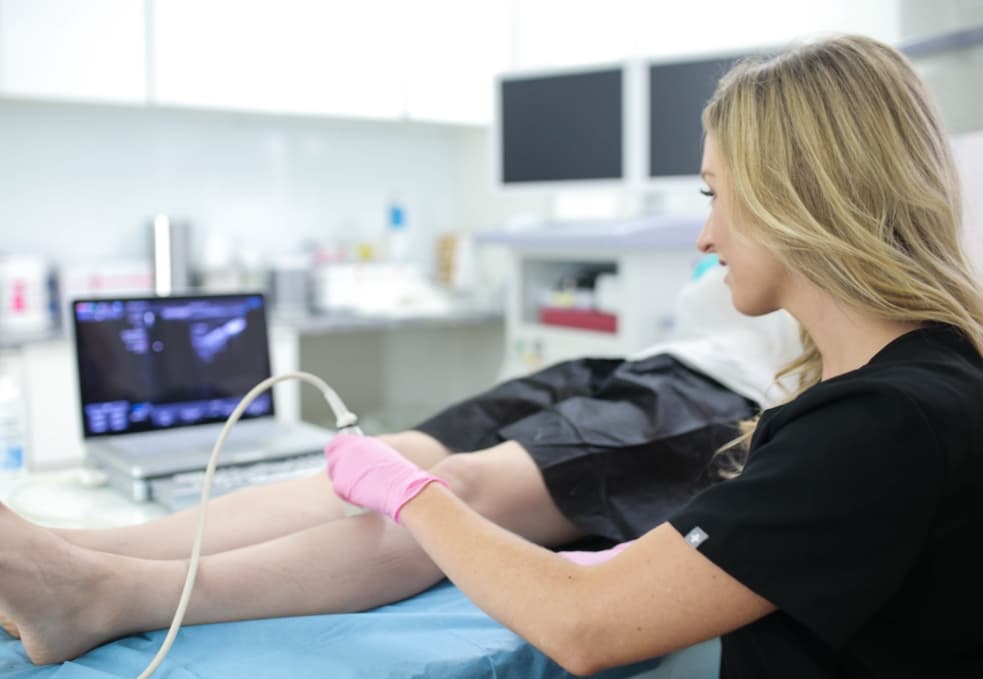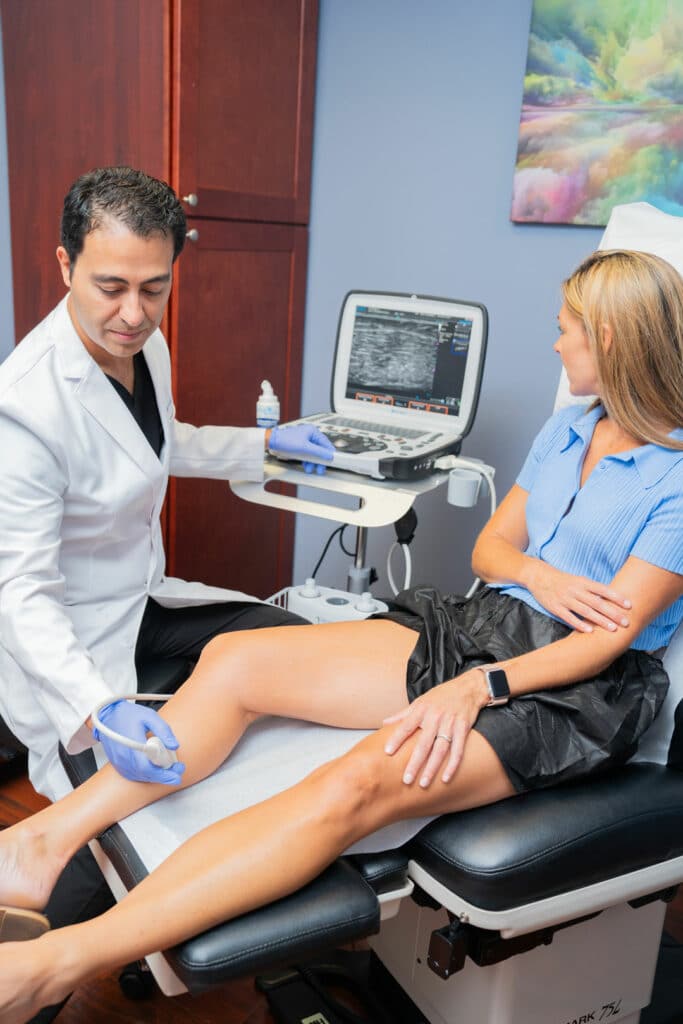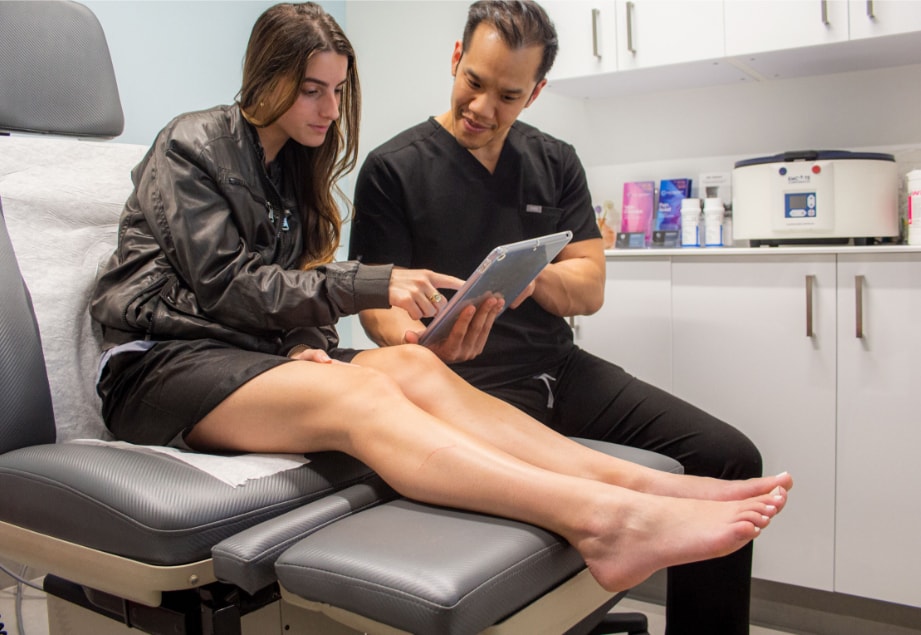Are you concerned about spider veins during pregnancy? You’ve come to the right place!
If you’re concerned about spider veins during pregnancy, you’ve come to the right place. This article helps you understand why you have a higher risk of spider veins during pregnancy, how to minimize the risk of spider veins, and how to treat spider veins. But before discussing the reasons for spider veins during pregnancy, let’s explore what spider veins are in general.
And if you have spider veins during pregnancy or the signs and symptoms of other vein problems, we encourage you to visit our vein center in Maryland. We have a state-of-the-art vein center located in Bethesda, Maryland, led by highly-skilled, board-certified vein doctors. We examine your spider veins and curate the ideal treatment plan to alleviate your symptoms.
Please schedule an appointment to learn more about spider veins during pregnancy.

What are spider veins?
Spider veins are dense clusters of small, thin veins that lie close to the surface of the skin. They are usually red, blue, or purple and can often be seen on the legs and face. Spider veins are common and usually do not cause any pain or discomfort. However, some people may feel a burning or itching sensation, and they can sometimes be painful in a sensitive area.
What are the possible causes of spider veins?
There are many possible causes of spider veins, but the most common cause is chronic venous insufficiency. This condition occurs when the valves in your veins stop working properly, causing the veins to swell. The vein valves are responsible for ensuring smooth blood circulation to the heart against the force of gravity. When the vein valves collapse, blood flows backward and accumulates in the leg veins, eventually leading to vascular dilation and the formation of spider veins and varicose veins.
Why do women have a higher risk of spider veins?
Women have a significantly higher risk of spider veins than men. It is estimated that about half of all women will develop spider veins, and about one-quarter will develop varicose veins at some point in their lives. There are several reasons why women are more prone to developing these conditions than men.
Women have a higher risk of developing blood clots. This is because the female hormone estrogen makes blood clot more easily, leading to a higher risk of vein disease. Another reason why women are more likely to develop spider veins is that they have a higher percentage of body fat than men. This extra fat puts pressure on the veins, leading to a higher risk of vein problems.
The female hormones estrogen and progesterone also weaken the vein valves. And since women have a higher volume of estrogen and progesterone, their vein valves are more likely to collapse, leading to backward blood circulation and the symptoms of chronic venous insufficiency. As such, numerous factors contribute to making women more prone to spider veins and varicose veins.
Why do you get spider veins during pregnancy?
During pregnancy, the risk of developing spider veins and varicose veins increases. This is due to the increased levels of hormones in the body, which can cause the walls of the veins to relax and the veins to enlarge. The extra weight of the baby can also put pressure on the veins, which can cause them to become more visible. The increased blood volume and pressure from the growing uterus can also contribute to the development of spider veins.
If you are pregnant and develop spider veins, there are several things you can do to help prevent them from getting worse. Exercise and elevating your legs can help improve circulation and reduce the pressure on the veins. Wearing compression stockings can also be helpful. If spider veins are causing you pain or discomfort, your doctor may recommend treatment with lasers or sclerotherapy. But if there’s no pain, you can leave them alone until after childbirth.
What are the other signs and symptoms of chronic venous insufficiency?
Chronic venous insufficiency (CVI) is a condition in which the veins have difficulty sending blood from the legs back to the heart. This results in a pooling of blood in the legs and can lead to a number of symptoms, including spider veins, varicose veins, and swelling in the legs and feet. CVI is a progressive condition, which means that it typically gets worse over time. If left untreated, CVI can lead to serious complications, such as ulcers and blood clots.
The most common symptom of CVI is the development of spider veins or varicose veins. Other symptoms of CVI include swelling in the legs and feet, aching or pain in the legs, cramping in the legs, itching or burning sensation in the legs, and restless legs syndrome. If you are experiencing any of these symptoms, you must see a vein doctor to explore your minimally invasive treatment options. CVI is a progressive condition, so the sooner it is diagnosed and treated, the better.
How can I prevent spider veins during pregnancy?
Spider veins and varicose veins are common during pregnancy. There are no definitive ways to prevent spider veins during pregnancy, but there are things you can do to reduce the risk:
- Wear supportive clothing. This will help to prevent the extra pressure on your veins that can lead to spider veins.
- Wear a compression hose. This will push the accumulated blood towards the heart and reduce the symptoms of vein disease.
- Exercise regularly. This will help to keep your blood flowing properly and prevent the pooling that can lead to spider veins.
- Elevate your feet when you can. This will help to reduce the pressure on your veins and ensure blood continues flowing towards the heart.
Should I undergo vein treatment during pregnancy?
While vein treatment is generally safe during pregnancy, there are a few things to consider before making a decision. Spider veins are usually harmless and don’t require treatment. However, if they cause pain or discomfort, you may want to consider treatment. Varicose veins, on the other hand, can be more serious. If you have varicose veins, you may be at risk of developing blood clots.
Please contact your vein doctor in Maryland to determine if you should undergo spider vein treatment.





